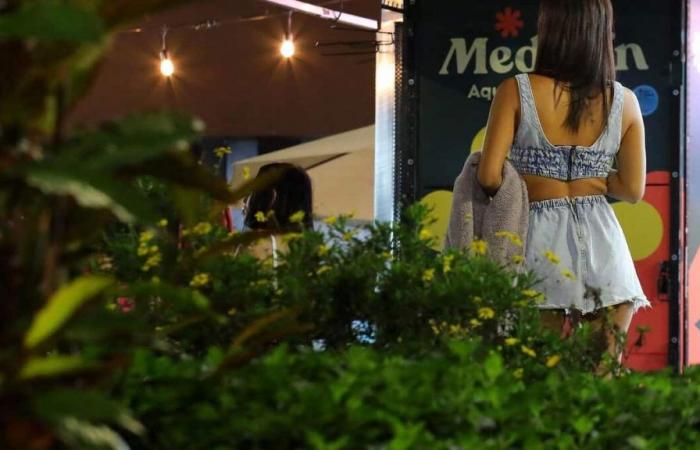Every evening, the scene repeats itself: hundreds of scantily clad young women set up shop in one of the main squares of the Colombian city of Medellín to offer their sexual services.
Known in the 1990s for violence linked to drug trafficking, Medellín is today an essential destination for trendy tourism and “digital nomads”. But, in a few years, with its lively nightlife, the city of 2.6 million inhabitants has also become a mecca for global sex tourism, including pedophilia.
“Women are the driving force of tourism in Medellín. Men come here to look for women and do drugs,” Milena, one of the many sex workers who invade the El Poblado neighborhood, popular with Western tourists, tells AFP.
Photo AFP
“Hit rock bottom”
If prostitution were restricted (it is currently legal), tourism “would drop a lot”, judges the thirty-year-old on condition of anonymity, saying she earns between $150 and $300 in one night, the equivalent of the monthly minimum wage.
But the offer is not limited to adults. “Global pedophilia is taking advantage of this to come here,” denounces Jazmin Santa, member of the local NGO “Intersectoral Committee against the Sexual Exploitation of Children”.
The “Personeria” (local institution responsible for human rights) noted an explosion in three years in cases of sexual abuse of children: 61 in 2021, 792 in 2022 and 1,259 in 2023.
At the end of March, the arrest of a 36-year-old American tourist, surprised in his hotel room in the company of two teenage girls aged 12 and 13, threw a harsh spotlight on the phenomenon. As no offense could be found, the man was released and flown to the United States, but the case sparked national outrage.
“We have reached rock bottom, the situation is serious and difficult,” commented Mayor Federico Gutierrez, who issued two decrees to try to stem “sexual exploitation,” promising to tackle “criminal gangs.” involved in this trade.
These decrees provided for stricter control of hotels, bars and nightclubs in the area, including a temporary increase in closing times, as well as greater control of tourists arriving at airports.
Photo AFP
“Escorts”
But in reality, nothing has changed, or almost nothing. Tourists continue to come in the evening to do their shopping among the trendy bars and nightclubs with garish neon lights where young women try to attract attention.
Sex workers negotiate with their clients in full view on the streets of El Poblado, where the late cocaine kingpin Pablo Escobar lived in the 1980s.
Medellín has become “an epicenter of sexual services in Latin America”, with many women coming from other countries and in particular from Venezuela, observes Jazmin Santa, who recalls that the city renowned for its “eternal spring” is also known as ” capital of the pornographic webcam.
For the president of the Antioquia department sex workers union, Valery P. Ramirez, the mayor’s response is “punitive and unconstitutional.”
If the measures do not directly target prostitutes, they “undermine the free and voluntary exercise of sex work”. And they do not solve “the crime of sexual and commercial exploitation of children”.
According to the same organization, some 1,500 adults engage in the sex trade in Medellín.
In Colombia, the age of consent is 14. Sometimes, perpetrators take advantage of the “fine line between consent and payment for a sexual service” with a minor, explains Jazmin Santa.
At least a dozen foreigners have been arrested this year for sexual exploitation of minors in Medellín, according to police figures.
“Narco, sex and Airbnb”
According to the town hall, the number of visitors to Medellín increased from 212,000 in 2015 to 1.5 million in 2023, half of them foreigners, some attracted by a narcoculture maintaining the memory of the bloodthirsty Escobar.
“The vast majority of tourists do not come to have sex,” tries to reassure the Secretary of State for Tourism, José Gonzalez. “But of course there are. As long as they do it legally, we can’t do anything,” he commented to AFP.
The city, which accumulates tourist awards, awards for “best emerging destination” and other “World Travel Awards”, seeks to focus on “health tourism, sports tourism and digital nomads”.
Behind this very marketing showcase, Medellín, like Barcelona, Venice and others, is now faced with the inconvenience of mass tourism.
“Narco, sex and Airbnb”, headlined an article in April from the think tank La Silla Vacia, pointing the finger at “prostitution, sexual exploitation and expensive rents”, with increasing gentrification of certain neighborhoods.
According to the town hall, Medellín has 14,000 Airbnb-type accommodations, including 6,000 in the El Poblado district alone.
In 2023, 39 foreign tourists were also killed in Medellín, including seven murdered, while several others were victims of scopolamine poisoning, a powerful alkaloid commonly known as “thieves’ drug” and sometimes used on users a a little too naive about dating apps.






